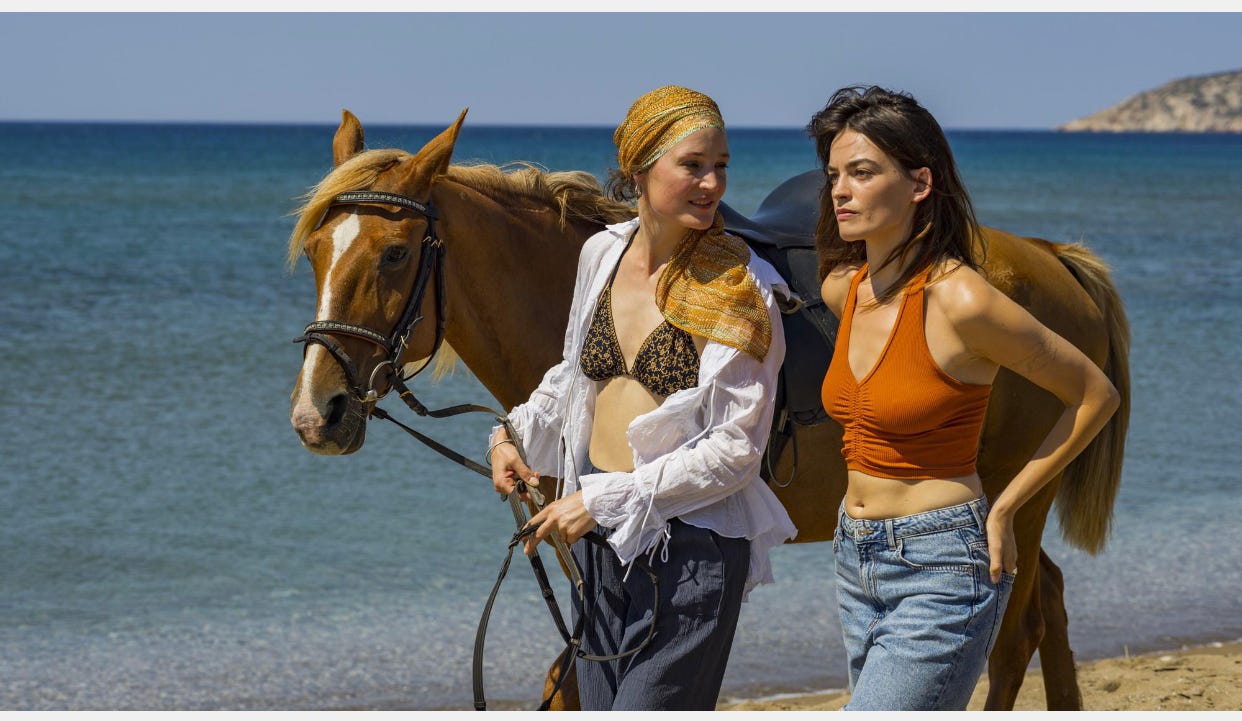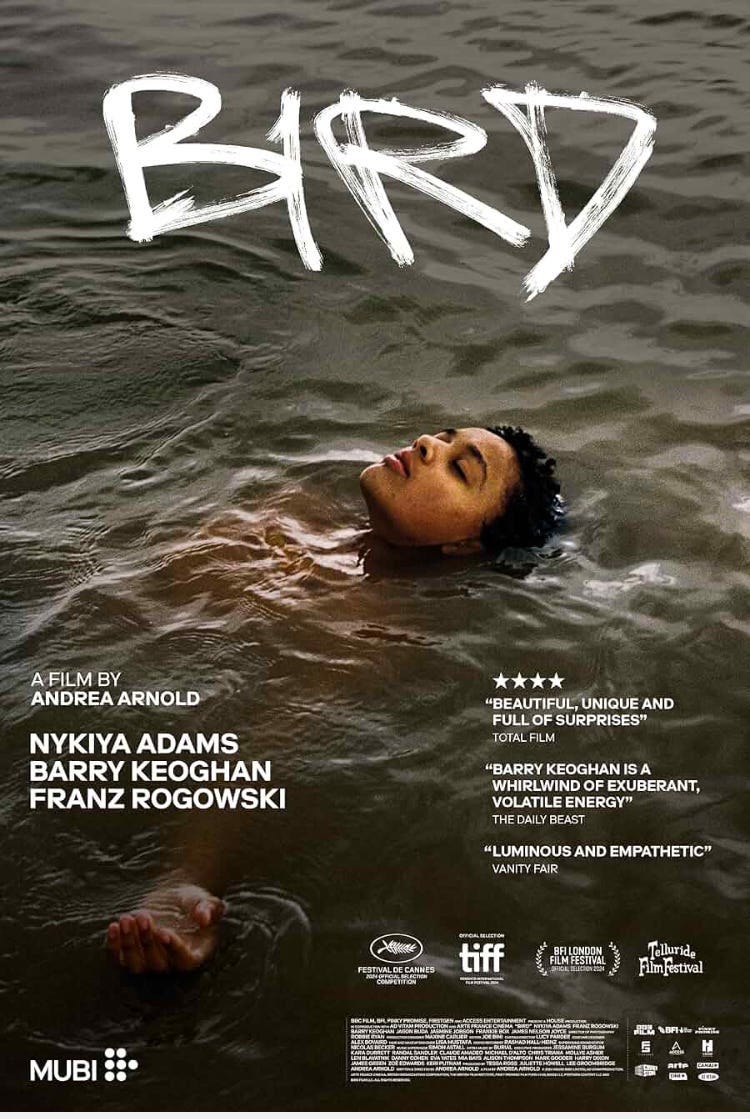Hot Milk is an intriguing psychological drama about three women, played by Emma Mackey, Fiona Shaw and Vicky Krieps, who for various reasons find it hard to move on with their lives.
Based on the book by Deborah Levy, and written and directed by Rebecca Lenkiewicz, Hot Milk begins (and ends) by telling a mother-daughter story. It follows Irishwoman Rose (Fiona Shaw) as she travels to Almería, Spain to visit a doctor in the company of her caretaker (and perennial anthropology student) daughter Sofia (Emma Mackey).
Rose is in a wheelchair, cause she has chronic pain and no control of her legs, which makes it impossible for her to walk, except for once a year, when she suddenly, miraculously can.
Sofia insists that Rose’s problems aren’t psychological, even though we wouldn’t blame her if she did, as mumbling and grumbling mum does enough to make her daughter’s life miserable. But as Sofia’s waitressing jobs leave her strapped for cash, while Rose is well-off, they are tied together in knots too complicated to unravel.
Rose and Sofia have come to Almería - the movie was shot in Greece, for financial reasons - to visit doctor Gomez (Vincent Perez), whose alternative methods may offer some sort of remedy for Rose’s ills. Gomez considers Rose to be an interesting case, which, as Sofia notices, makes perfect sense, as the treatment costs a small fortune.
I don’t think Gomez is meant to be a charlatan, it just explains why Rose and Gomez get to spend a lot of off-screen time together, which gives Sofia the chance to wander off by herself, to the beach, where she meets the free-spirited Ingrid (Vicky Krieps), who lives with a man but also starts an affair with Sofia.
In another movie this would probably be a life-changing event that would set Sofia free from her mother, but this story is more complicated than that. Ingrid may seem free, but she is haunted by an event from the past, which makes Sofia’s problems seem rather small.
So instead of breaking out of her shell, Sofia remains caught in a loop, which - after some late stage father / daughter conflict - eventually leads to a (potentially) final confrontation with her mother, after which the movie suddenly ends, leaving us to guess what happens next.
I have a lot of time for Rebecca Lenkiewicz. She has (co-)written award winning and mostly femme-centred movies like Ida (2013), Disobedience (2017), Colette (2018) and She Said (2022), while recently The Salt Path has done very well in The Netherlands. And, at the risk of stating the obvious, I like them all.
Hot Milk is her first foray into feature film directing, and while the movie shows definite signs of promise, I don’t think it’s completely convincing.
The drama is there, but I didn’t always feel it. That’s mainly because of a pacing problem, as the movie ambles along in second gear for most of its running time, lacking both a sense of dynamics and the pure passion to bring a complicated story like this fully to life.
There is some elegant camera work by Christopher Blauvelt, the distinctive sound design adds some tension to the story, while the Greek locations (standing in for Spain) are photogenic enough, and the actors are absolutely fine.
But I also kept wondering about the bold stylistic choices that someone like François Ozon (who has made plenty of femme-centric movies) might have added to a movie like this.
Hot Milk also suffers a bit in comparison to The Lost Daughter (2021), the compelling drama that Maggie Gyllenhaal adapted from the novel by Elena Ferrante, starring Olivia Colman, Jessie Buckley and Dakota Johnson.
Having said all that, the material on display is still intriguing enough to warrant a watch, even if it means going in with slightly lowered expectations.
I give it three stars.
Note: Hot Milk premiered at the Berlinale in February. Since then it’s been playing the festival circuit, while last month it was released in France. The movie is now getting theatrical releases in countries like the United States, Germany, Argentina, Brazil, the United Kingdom and Ireland, with the Netherlands to follow on July 17.
Bonus review:
Andrea Arnold openly flirts with the fantastical in her latest social realist drama Bird.
Written by Arnold herself, Bird tells the troubled but ultimately uplifting story of 12-year old Bailey (Nykiya Adams), who lives in the town of Gravesend, close to London in county Kent.
Bailey lives with her father Bug (Barry Keoghan), and her half-brother Hunter (Jason Buda), while her mother Peyton (Jasmine Jobson) lives with her three other daughters and her aggressive boyfriend Skate (James Nelson-Joyce) in another part of town.
Bug intends to marry his latest flame, Kayleigh (Frankie Box), which causes him to row with Bailey. When Bailey goes for a walk through the fields on the outskirts of town she is befriended by Bird (Franz Rogowski), a mysterious figure with a German accent who claims he is looking for his parents, who abandoned him when he was young.
Bird is a strange perhaps even mythical creature, who at times exhibits bird-like qualities. At first I thought he might be a figment of Bailey’s vivid imagination, but after a while we find out that Bird does communicate with other people too.
Bailey starts spending more time with Bird, helping him with his quest, while he, for his part, becomes part of her life too, and even, at one point, fixes a nagging problem for her in a way that’s the movie’s most obvious nod to the fantastical.
Arnold expertly captures the raw, manic energy of it all with very effective hand held camera work and ditto editing, which makes the movie feel even more lived in than it already does, like Ken Loach on speed.
The actors are uniformly great, with young Nikiya Adams emerging as a talent to watch and Barry Keoghan (Saltburn) having the time of his life as a wannabe drug lord trying to raise money for his upcoming wedding by getting his drug toad to release hallucinogenic slime through playing him sincere music - Yellow by Coldplay. (To be fair, the movie contains a mostly rousing soundtrack, containing tracks by Fontaines D.C. and Sleaford Mods).
Arnold touches upon well-worn themes as poverty, drug abuse, questionable parenting choices and domestic violence. But fortunately the British director, who gained quite a reputation with acclaimed social realist dramas like Fish Tank and American Honey, never condescends to her characters.
In fact Arnold infuses the movie with a sense of vitality that often transcends its decrepit surroundings.
I give it four stars!
Note: Bird is available through various streaming platforms like Apple TV and Google Play Films.







